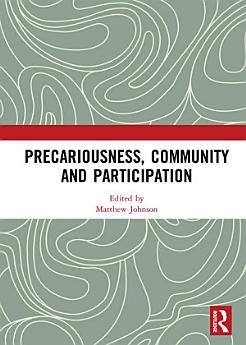Precariousness, Community and Participation
Matthew Johnson
Dez 2018 · Routledge
E-Book
172
Seiten
family_home
Zulässig
info
reportBewertungen und Rezensionen werden nicht geprüft Weitere Informationen
Über dieses E-Book
This book attempts to explore the effects of neoliberalism on particular forms of community. Guy Standing (2011) has popularised the notion of precariousness to describe the unpredictable neoliberal conditions faced by radically different people throughout the world. Members of Standing’s ‘precariat’ lack occupational identities, treat work and other moneymaking activities instrumentally, are focused on the short-term and have no ‘shadow of the future’ hanging over their actions, leaving little incentive to sustain long-term relationships and productive, but unpaid, social activities. This issue presents an interdisciplinary account of the challenges faced by communities at a time in which neoliberalism seems unchecked and uncheckable by the rise of nationalist populism. At points, responses are presented, but it is perhaps reflective of the general sense of helplessness of those committed to tackling neoliberalism that the final article highlights serious deficits in an approach commonly presented as a practicable response: basic income. In the spirit of participation, each article is accompanied by a reply by a non-academic as well as an academic. This ought not to be seen as tokenism – the experience of the project has been that discussions can be advanced much more effectively through engagement with community members and professionals.
The chapters in this book were originally published as a special issue of Global Discourse.
Autoren-Profil
Matthew Johnson is Lecturer in Politics at Lancaster University, UK. His research examines issues such as Englishness and the relationship between culture, policy and wellbeing. He led a participatory project entitled ‘A Cross-Cultural Working Group on "Good Culture" and Precariousness’, which involved exchanges between people from Ashington and Aboriginal Australian communities.
Dieses E-Book bewerten
Deine Meinung ist gefragt!
Informationen zum Lesen
Smartphones und Tablets
Nachdem du die Google Play Bücher App für Android und iPad/iPhone installiert hast, wird diese automatisch mit deinem Konto synchronisiert, sodass du auch unterwegs online und offline lesen kannst.
Laptops und Computer
Im Webbrowser auf deinem Computer kannst du dir Hörbucher anhören, die du bei Google Play gekauft hast.
E-Reader und andere Geräte
Wenn du Bücher auf E-Ink-Geräten lesen möchtest, beispielsweise auf einem Kobo eReader, lade eine Datei herunter und übertrage sie auf dein Gerät. Eine ausführliche Anleitung zum Übertragen der Dateien auf unterstützte E-Reader findest du in der Hilfe.






